|
|
Activist Armenians chomp at the bit to get you to
think there is no difference between their invented genocide and the
Holocaust. The Rwandan Genocide, a real genocide of the 20th century and one
of the few conforming
to the rules of the 1948 U.N. Genocide Convention, does not carry as much
political clout. Crafty Armenian activists have primarily ignored the Rwandan
Genocide, as has the rest of the world; however, when there is an opportunity
to hang on to genocide coattails, in a pathetic attempt to legitimize their
invention, you can bet Armenians have made use of the Rwandan Genocide, as
well.
As an example: On March 30, 2006, the Armenians connived the naive Rwandan
mission in New York City into a conference entitled "Genocide Then and
Now: Lessons Learned for the Twenty-first Century." starring the
notorious Vahakn Dadrian. By way of the legitimate Rwandans, the Armenians
managed to hold the conference on United Nations grounds. It is very possible
the U.N.'s special advisor on genocide prevention, Juan Méndez (the one-time
president of the ICTJ, and
an Armenian partisan), helped attain U.N. space, by way of being an
"invited speaker" — a terrible abuse of his position,
irresponsibly giving the impression that the U.N. had acknowledged the
Armenian claims, when Méndez was fully aware that was not the case. (The postscript to
this sorry tale was that the hoots and hollers of the predominant Armenians in
the audience, once the bigoted New York Times moderator, Andrea
Kannapell, attempted to disallow party-crasher Prof. Turkkaya Ataov from
speaking, permitted the Rwandans to see the circus they had been tricked into
being a part of, and their mission dismissed themselves; reportedly, their
scheduled speaker declined to participate further. ADDENDUM:
It was actually a U.N. official, Ibrahim Gambari, who declined to speak. No Rwandan speaker was scheduled, which
makes one wonder what Rwanda was doing there, as surely the others did not
overly stress Rwanda; the third and last speaker was Yael Danieli, another
"Holocaust and Genocide Studies" specialist.)
Let's take a look at the Rwandan Genocide, and examine ironies in relation to
the Armenian story.
For this discussion, we'll rely on the claims presented by an excellent
documentary, Shaking Hands with the Devil: The Journey of Roméo Dallaire
(Peter Raymont, Director, White Pine Pictures, 2004.) Naturally, none of us
would want to operate on the amateurish level of Dr. Robert Jay Lifton, and
accept as truth what one singular source claims. To get at truth, one must
always dig deep; the validity of the facts presented on this program, however,
will suffice for our comparative purposes here.
|
|
|
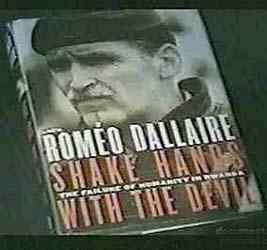
The inspiration for the film was a book written by
General Dallaire,
Shake Hands with the Devil: The Failure of Humanity in Rwanda. |
The film dramatically begins with the following:
In 1994, Canadian General Roméo Dallaire led a hopelessly underfunded United Nations
peacekeeping mission to Rwanda.
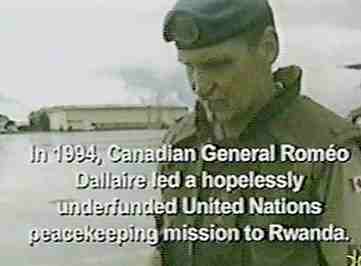
Abandoned by the Western powers, he watched helplessly as more than 800,000 Rwandans
were slaughtered in 100 days.
As the genocide raged, Dallaire was condemned to peer into the heart of darkness, to
witness the failure of humanity, to shake hands with the devil.
In a nutshell, the events that had gone on before this catastrophe can be summed up by a
three-year war. The government, led by President Juvénal Habyarimana, was challenged by
rebels, led by General Paul Kagame. Shooting finally gave way to talking, and the Aruba
Peace Agreement was signed on August 4, 1993. The United Nations sent in a small
peacekeeping force, basically without resources. As a commentator tells us, "The
whole thing was a bluff."
The executive assistant of General Dallaire, Major Brent Beardsley, elaborated further:
"...Not just the government and rebels, there was a third group, and it was a group
determined not to see Arusha implemented."
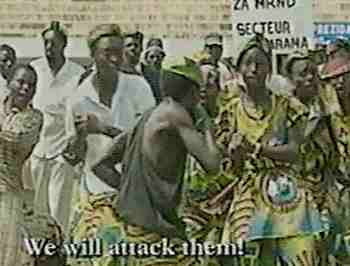
"We will attack
them!"
"It seems they were guys running around in baggy colored suits and they looked like a
bunch of clowns. It turned out they were the Interahamwe; they were the youth wing of the
extremists. They did hate Tutsis and they wanted to kill them. They listened to the
propaganda of the radio station that the Tutsis were a threat, they were coming back to
take back our land, take away everything we had."
Thus we begin with the first of our comparative ironies. The "Armenian Genocide"
was also begun by the extremists in the Armenians' midst, terrorist Dashnaks, Hunchaks and others. If not for the trouble these
groups began, the resettlement process (or what Armenians refer to as a
"genocide") would not have taken place, as even Armenia's first prime minister admitted. ("This was the
terrible fact!" as he put it.)
The way the Armenian terrorists attempted to cajole ordinary Ottoman-Armenians to accept
their fanatical views, other than lying and coercion, was to dehumanize the Turks. It was
this "seed of the poisonous flower of racism and nationalism... sown and carefully
cultivated in the minds of the (Armenian) youth," as Dashnak historian Mikael
Varandian wrote in 1910, that produced
"scandalous excesses, obviously found in the most intense pleasure in indulging in
the most irreconcilable scorn and hatred of the Turks."
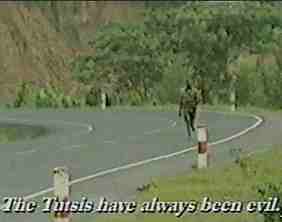
"The Tutsis have always
been evil."
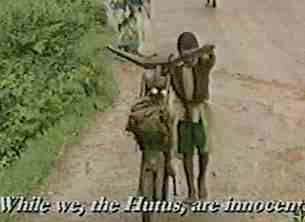 |
|
"While
we, the Hutus, are innocent." |
The film illustrated how propaganda broadcasts influenced the
crackpots among the Hutus... just as the Armenians were influenced by Dashnak/Hunchak
propaganda. The one difference is that while the Hutus have calmed down, Armenian
propaganda is still perpetuating Turkish hatred today. A visit to your local, unfriendly
Armenian forum will display how deeply the Armenian rank and file still make a religion of
their anti-Turkish hatred. The above image's subtitle reads, "The Tutsis have
always been evil." Next, we read, "They may smile and wink, but they will
take your children away." The idea, of course, is to dehumanize the
nationally-binding "enemy." Finally, "While we, the Hutus, are
innocent." The last one is particularly potent, as the Armenians have made
"innocence" into an art form. The West still sees the Armenians of the period as
poor, innocent, defenseless lambs led to the slaughter. (So blinded is the West by
prejudice and Armenian propaganda, when they witnessed first hand Armenian savagery in Azerbaijan in the early 1990s, the
West closed its eyes almost completely... "Shaking hands with the Devil" in its
own right. Armenians today are mainly regarded as the victims of that conflict.)
Dishonest genocide partisans, at a loss to explain how their mythological Armenian
genocide could have taken place, have devised all sorts of deceptive reasons, the primary
one being that the Turks tried to clean out non-Turkic elements. (The "pan-Turanistic,"
or "Turkey for the Turks" reason.) These theories fall flat when one considers
the many other Ottoman ethnic groups that remained unaffected, but the main point is that there
was no network of hatred against Armenians in Ottoman society. If there had been, as
an example, the many thousands of Armenians could have never inter-married with Turkish
people as they did during the war years, regardless of whether the Armenians had converted
to Islam or not.
|
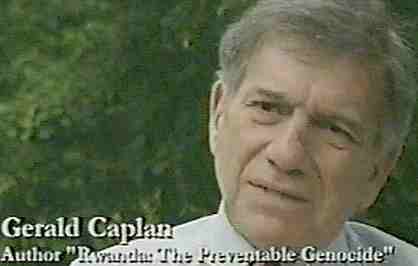
Gerald Caplan, Author,
"Rwanda: The Preventable Genocide"
ADDENDUM:
While watching the film, my "genocide scholar" alarm bells began ringing
in the case of Gerald Caplan, as much as I appreciated his insight and intellect.
A week after finishing this page, I inadvertently ran into an article he wrote in
Canada's The Globe and Mail ("RWANDA'S GENOCIDE: FIRST THE DEED, THEN
THE DENIAL," March 13, 2007); here was the inevitable zinger:
"The Turkish nation, led by its government and military, overwhelmingly
denies the consensus of objective scholarship — that the Turkish government in
1915 set out to annihilate the country's Armenian population and murdered more
than a million of them."
Since there is absolutely no evidence that the Ottoman (not "Turkish")
government "set out to annihilate" anyone, we have learned that Gerald
Caplan would not know "objective scholarship" if it bit him on the butt;
note as well the immorality of stating every Armenian of his doubled mortality
figure had been murdered. What possesses so many intelligent and apparently fair
people to sacrifice their credibility, to mindlessly accept harmful propaganda
without scratching the surface?
|
Author Gerald Caplan: "You can understand an entire people
growing up, learning certain mythologies about themselves and their neighbors; and
all the Hutu grew up, often in church-sponsored schools, learning that the Tutsi
were different, and probably alien."
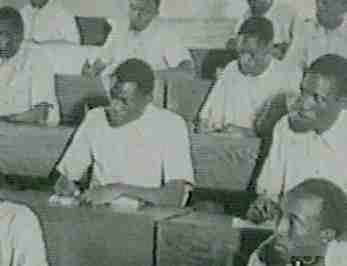
Paralyzingly on a tee with the Armenian experience! Mostly content for over five
centuries to the point of being regarded as the "Loyal Nation," what
exacerbated the mostly prosperous Armenians' treachery with their own Ottoman nation
were the missionaries. As Horen Ashikian wrote (or was quoted) in "History
of Armenia": "The Protestant missionaries distributed in large
numbers to various places in Turkey made propaganda in favour of England and stirred
the Armenians to desire autonomy under British protection." Vilification
was the strategy for the Turk-disliking missionaries (see "Footnote 7" on
this page, to get an idea, from the
book by Missionary Clarence Ussher.)
The American author, F. Hopkinson Smith, the rare westerner who knew the real scoop
, understood that (in the words of a critic)
"had it not been for the attitude of missionaries in Turkey many of the
outrages would not have happened." In an 1896 interview, Smith hit it on the
nose: "There is not a missionary In Turkey who is not a sympathizer or a
revolutionist at heart. They despise the Mohammedan religion and the Turkish
people."
The missionaries' harmful work, under the guise of performing good, was not a
phenomenon restricted to the Ottoman Empire. Evidently, they did their bit in
twisting minds in Rwanda in years past, helping to perpetuate hatred.
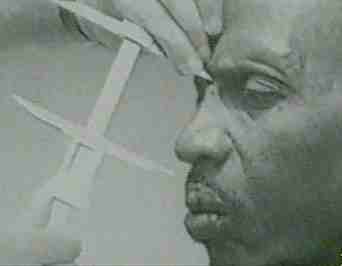
Lieutenant General Roméo Dallaire appears to have said (in an unidentified
voice-over) that "The problem that essentially was created by the Belgians who
had this country as a colony, y'know, through their whole ethnicity exercise and
their anthropologists who had gone on a wild spree of idiotic theories, and sizes of
heads and this and that, and the administrators included the ethnicity on the I.D.
cards, and that then split the country, and identifies you as elements (of
difference?)."
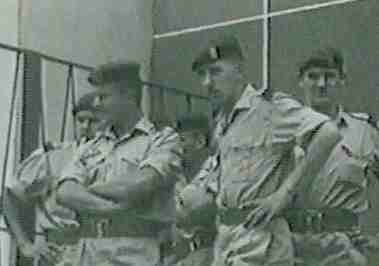
Belgian troops
occupying Rwanda in prior years.

Stephen Lewis, U.N.
Envoy for Africa
Stephen Lewis (in an unidentified voice-over) embellished: "I understand the
intense ethnic hatreds weren't really in the soul of (the) Hutus and Tutsis but were
stoked and encouraged by the imperialist powers over the years."
Just as in the Ottoman Empire; as Sir Charles Eliot wrote in 1900's "Turkey
in Europe":
"The Turks and Armenians got on excellently together... The Russians restricted
the Armenian Church, schools and language; the Turks on the contrary were perfectly
tolerant and liberal as to all such matters. They did not care how the Armenians
prayed, taught and talked... The Armenians were thorough Orientals and appreciated
Turkish ideas and habits... (They) were quite content to live among the Turks....
The balance of wealth certainly remained with the Christians. The Turks treated them
with good-humoured confidence..."
There was, in fact, generally a brotherly feeling between Armenians and Turks. Once
the Sick Man began to seriously weaken in the 19th century, the imperialist nations
began lining up to distribute the waning empire's riches among themselves. The
Armenians, now getting fired up by the fanatics in their midst, became the perfect
patsies for nations such as Russia, England and France to try and weaken the
Ottomans further. It served the purpose of these imperialists to drive a wedge
between the two peoples, in a classic example of divide and conquer. The treacherous
Armenians, blinded by their greed, racial pride and ever developing hatred, were
only too happy to be used as pawns.
|
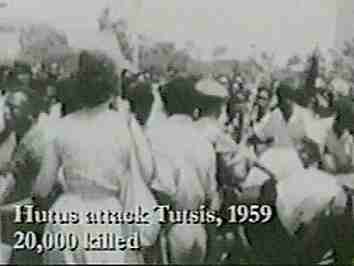
"Hutus attack Tutsis, 1959;
20,000 killled."As with the "Armenian genocide,"
these events did not take place in a vacuum. Without an understanding
o f the history that has transpired, it would be impossible to fully appreciate
and adequately address complex events. Not to mention, it would be dishonest. |
Major Beardsley filled us in on more background information:
"Normally it is a U.N. practice that the former colonial power does not participate
in peacekeeping missions on former colonies. So the Belgians technically should not have
come to that mission; but they were the only ones that were putting (qualified) troops on
the ground. Canada accepted the enforcement position... but could not give the contingent
because Canada at the time was literally out of troops. The Ghanayans contributed a
battalion and the Tunisians contributed a company. And the other four hundred was
Bangladesh. That then became our force."
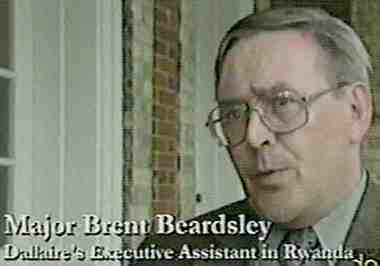
Major Beardsley
Roméo Dallaire:
"I had extremists, I had hard-liners, and I had moderates. Now, these guys did not
believe the war was over. And as much as I kept telling them, listen: you're at peace. The
peace agreement has been signed. You are in the process of moving to a whole new political
plan. There could have been possibilities. But by then, they knew that they wanted to keep
the war going. They knew they were going to do the massacres and then relaunch the
war."
Reminiscent of how the Dashnaks and Young Turks had embraced each other in revolutionary
brotherhood; once the common foe, Sultan Abdul Hamit, was deposed; the CUP dusted off the
old constitution, implementing true equality. Everyhting was hunky-dory; finally, there
was this "peace agreement" between the Ottoman government and the trouble-making
Armenians. Practically before the ink was dry, the Dashnaks were up to their old
treacherous tricks again. Just one short year or two later (in 1910), the revolutionary
committees began to distribute the “Instructions for Personal Defense” throughout
eastern Anatolia, the blueprint for their impending rebellion. With sections such as “To
Attack Villages,” defense was the last thing borne in mind. (The Armenian
Rebellion at Van, 2006, p. 183.) Already accustomed to committing massacres in the
1890s (mainly to force European intervention, by hoping to incite counter-massacres),
aided by their identity-sustaining racial hatred against Turks, the Armenians were waiting
for the opportunity to "relaunch the war." Their extermination plan would snuff
out the lives of over 500,000 Turks/Muslims (and others who did not fit the preferred
racial/religious prototype, as the Jews) during the WWI years... an ethnic cleansing
episode of great magnitude that has yet to be acknowledged in the prejudiced West.
Stephen Lewis:
"What the world fails to understand is that there was diplomatic information flowing
in, in significant quantities. The French, the Italians, the Vatican, the various
governments that have missions in Rwanda, they were sending reports at the end of 1993 and
early 1994, which signals an apocalypse. The French government worked with the Rwandan
government that was planning the genocide, knew everything that was going on, then not
only didn't complain, but did the opposite, legitimized and spoke on behalf of the
government everywhere in the world. So the French government kept giving the killers the
conviction that they could get away with murder."
In the Ottoman Empire of 1915, once the resettlement policy got underway in June, the
diplomatic information was probably at least as much, if not more. The difference is that
while in Rwanda the missions were conveying accurate information from first-hand sources,
the Turk-condemning diplomatic information from the earlier period derived almost entirely
from hearsay. All of the consuls, including those of the Ottomans' allies, had Armenian
interpreters, and there was a deep, overriding prejudice against the "Terrible
Turk" to begin with. Genocide partisans who advocate rushing in to "prevent
genocide" can't find a better example of how corrupt such information could be. And
in stark contrast to French actions in Rwanda, where the French aided and abetted the
genocide, in 1915 the French and their Entente Allies rushed to condemn the Ottomans. In both cases,
the French had ulterior motives; in 1915, it was advantageous for the French to present
the Turks as monsters, not only helping to justify land-grab schemes, but to take the heat off of the crimes committed by
ally Russia.
|
|
A successful soldier and informant Jean-Pierre, "had been tasked to train the
Interahamwe and he knew what they were doing was preparing for extermination."
The New York based United Nations forbid their small force from getting involved, as
"they just got shy."
Roméo Dallaire angrily declares, "Then the bastards should have pulled us
out." When the Rwandan president gets shot down in his airplane, the government
collapses; all hell then breaks loose.
Major Beardsley:
"There was a lot of confusion and a lot of panic. Phone calls were coming in,
about a hundred an hour. The overwhelming majority of those people that I spoke to
were killed that day. They didn't live. And there were teams of presidential guards
that moved in; they knew exactly where those moderate ministers, their families, ..
the opposition leaders were, they grabbed the individuals, took them away and killed
them. This was a very, very well planned and extremely well executed attack on Hutu
moderate ministers and innocent Tutsis."
Genocide propagandists accuse the Ottomans of the same, with the arrest of the
Armenian "intellectuals and cultural leaders" on April 24 and after, and their wholesale murder. The difference
is, while it was certainly inevitable for innocents to be swept away in such an
ensuing flood, most of these leaders were behind the Armenians' traitorous rebellion, and as a rule, they
were tried in court before having punishments doled out; a respectable number (35 of
the 235 from April 24) was released, with many others imprisoned or resettled.
At this point, the extremists struck at the Belgian contingent, which served as the
glue of the U. N. peacekeeping force; ten of their soldiers were killed, prompting
criticism against General Dallaire for his inability to save the Belgians.
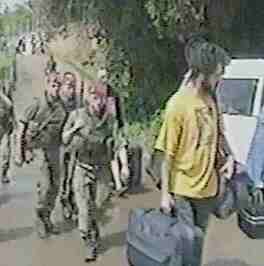 |
|
The
Belgisans move their people out. |
Caplan: "One of the great missed
opportunities was in the first three days when the Italians, and the Belgians and
the French all sent planes in to rescue their own expatriates. And there was a force
of 2,500, all armed to the teeth; every single one was obsessed only with saving his
own expatriates. They didn't know much of what was happening, they didn't care what
was happening, Africans were going to kill Africans.. what was it their business?
And not one of them — not one single one of them — [was] offered to delay or to
help in saving the Tutsis. And at that moment, they had united behind Dallaire —
they could have stopped the damned thing within two or three days and not one single
country's soldiers did it."
Pretty despicable, isn't it? It would have been one thing to have made the difficult
decision to commit troops. But once troops were sent in for whatever reason and were
already there, how could these nations have justified not lending at least a minimal
helping hand? The Belgians especially had an obligation to assist the land and the
people they had taken advantage of for so long, and the French are so especially
hypocritical, given their sanctimonious "thought control" laws on
genocide.
The film's "talking heads" vent:
Stephen Lewis:
"What was it about Rwanda, what was it about that period, why was there this
incredible moral default on the part of the world? I guess when you strip everything
away, Africa didn't count anymore. And Africa was Africa, it was black. So all of
the unlovely racist impulses came into play. Africa had nothing to sell, nothing to
buy; you just wrote off the continent. And Rwanda in 1994 was sort of the apotheosis
of that feeling."
Major Beardsley:
"....When they realized no one was going to reinforce the mission, the Belgians
had made the decision to withdraw when the Rwandese needed them the most. They put
their tail between their legs, and they ran away."
Roméo Dallaire:
"It's ironic that in the same day as fifty years previous my father was with
other Canadians dying and some of them, a number of them, injured and so on,
fighting to liberate Belgium, while Belgium still had that colony under their
control. And troops in the colony. And still raping it at the time. I mean, the
perverseness of that is just beyond me."
|
| The
Psycholgy Behind the Killings |
Bonaventure Niyibizi, a Rwandan whose mother was killed: "I cannot understand
how you could kill a one-week-old baby. How you can take a pregnant woman, and take
the baby, and kill the both of them. I have never been able to find a good
explanation, but the truth of the matter is that it happened."
While Armenians and missionaries have related the most awful stories about the Turks
to stress the Turks' well-told brutality, such as when Peter Balakian repeated how
some Turks would nail horseshoes on Armenian feet (just one of the countless
delights he offered in his abominably propagandistic "The Burning Tigris"; here
are a few horror tales from The
New York Times, as told by a missionary), almost all of these campfire fables
arrived secondhand. Not to say the Turks were not guilty of crimes and violence, but
the authentically recorded damage resulting from the worst deviltries occurred at
the hands of the Armenians. The Armenians operated from hatred, and the Turks did
not. (At least not initially, for some.) The Armenians did not have to utilize much
imagination in the telling of their horror stories, having committed them, and (as
usual) then passing off their misdeeds as ones committed by Turks. People, including
babies, would not simply be killed, but killed in the worst "Hannibal Lecter"
sort of ways; organs torn away, features cut off — the works. As Rafael de Nogales
recorded, the Armenians took a special pleasure in their killing, the extent of
which we know took place, recorded often in firsthand ways by their own allies —
such as this Russian officer.
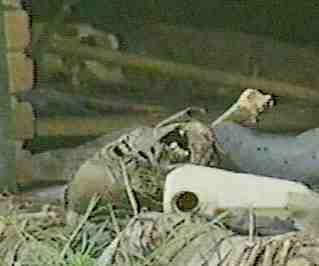 |
|
A
horror movie brought to life. |
Roméo Dallaire: "Once you've killed once,
then your whole inhibition has disappeared. And so it becomes an act of slaughter.
You create such an atmosphere in yourself that there is a certain gaiety in it. You
know, Jeez, I chopped that guy's head off in one shot, that was a lot better than
before. And then the other ones were like, I chopped the knees off. Or I chopped
this guy's penis off, and did you see him run. And that whole thing, then [gets to
be] like a tonic, or it's like booze, you know, and you get more and more
drunk."
The film informs us that the killing frenzy takes place among church members as
well, as parishioners kill fellow parishioners.
Caplan: "The Catholic Church could have stopped the entire thing years before
it began. They were the largest church in Rwanda, they had extraordinary influence
both with the government, with the elite, and at the mass, at the parish level, and
if they had said a sin against God it would have been stopped; and the Church
refused to do that. They believed democracy equaled quantity. And since there were
far more Hutu than Tutsi, it was proper that the Hutu should run everything. So the
Catholic Church had gotten away with murder, literally."
Wow, the Catholic Church was just like the genocide community, wasn't it? Genocide
advocates similarly point to the opinions of genocide scholars, to validate the
"Armenian genocide," as if majority agreement was ever a substitute for
the truth. Since ignorant or agenda-ridden bigots will always outnumber those of us
who prefer stressing integrity, in this case too, it should only be fitting for the
majority to rule. Paradoxically (used as a figure of speech; actually, there's
nothing paradoxical about it, if we know some of our opportunistic Armenians), the
Armenians in the Ottoman Empire did not constitute a majority anywhere (according
even to Richard Hovannisian), and yet
they felt it was proper that they should run everything. (Naturally, if they ever
had the chance, the last thing they had in mind was "democracy"... as they
proved so frighteningly in Armenia itself, almost wiping out during 1918-1920 what was once the Muslim majority.)
|
"There comes a moment in time when human behavior is
capable of the most ferocious and irrational activity. This capacity to go berserk, to
have no semblance of feeling for the human condition at all, apparently it lies in us,
apparently it lies in human behavior. I don't know what is so crazed as to trigger it,
but it's there."
As told in the film by the wondrously articulate Stephen Lewis; words of wisdom only a
fool can argue with. Now note how the racist genocide scholars would have you believe,
in their preferred simplistic, black & white presentation of events, that only
certain chosen people may serve as victims, and others must always be seen as
exclusive villains... perpetuating hatred against the latter designated ones, again
and again. We are all influenced by the same human imprinting, and yet most so-called
genocide scholars feel no compunction in allowing you to believe certain
"races" are simply more capable of murderous ability. |
The UN Security Council voted to withdraw all but 300 of their peacekeepers on April 21,
1994. In short, the United Nations itself chose to abandon the country. Major Philip
Lancaster (Dallaire's Military Assistant in Rwanda) wryly added that nobody cared, and
yet,: "Most people in most of the world were absolutely fascinated by O. J. Simpson's
gloves."
 |
|
Michael
Enright, CBC Journalist |
A calculated decision to get the word out to the world was made by a
frustrated General Dallaire. The reporter Michael Enright (who deserves our respect, in
the way he once handled Taner Akcam in a radio
interview) stated: "Canadian military personnel usually don't talk frankly to the
media if they, in fact, talk at all. So to find a general in a war situation willing to
come on the telephone and talk to the CBC as candidly as he did is astounding."
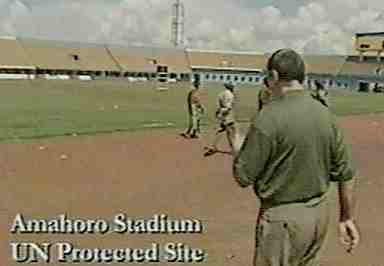
General Dallaire rediscovering Amahoro Stadium
General Dallaire: "When the war started, the place (Amahoro Stadium) filled up. At
one point they were up to 12,000 in here. So you can imagine 12,000 people trying to live
in here. So we got this latent smoke that hangs in here and then all you see is people and
clothes, y'know, and rags and stuff. So the place looks absolutely, totally out of
control. It became, probably in the most pejorative way, sort of like a concentration
camp. We were out there protecting them, but as we were protecting them out there, they
were inside dying. Because of lack of water, lack of food. ...The stench was so powerful,
you had to actually force yourself not to puke here."
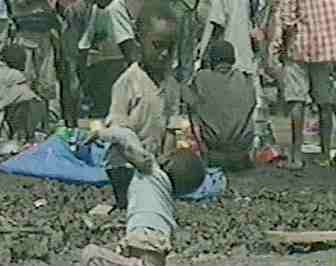 |
|
A sad scene
at the stadium camp |
For those such as Dr. Rudy Rummel
(ADDENDUM: And film spokesman Gerald Caplan, as you have read above) who enjoy telling us the Ottoman Turks murdered the
Armenians who died of famine and disease, the reader may see that would have been as
absurd as accusing General Dallaire's desperate force as having murdered the Rwandans who
died in this camp of similar factors. A shortage of farmers, while most able-bodied men
were conscripted, stopped farm production to the extent that even Ambassador Morgenthau
pointed to the deaths of "thousands" of Turks "daily." (Even Turkish soldiers were dying in the thousands from famine
and disease.) Add the British naval blockade and locust plagues, and the end result was
that there simply was not enough food and medical treatment for everyone. Such a tragic situation has nothing to do with
intentional murder.
The film documents how Dallaire, haunted by the memories and the impossible situation he
was trapped in, returns to Rwanda, attending, for one thing, the Conference on Rwandan
Genocide (in Kigali, April 6, 2004). As he travels, he is hit with the question about why
he did not stop the genocide. When asked, Dallaire tells us that disobeying orders would
have been a "Hollywood" thing to do, or a demonstration of showmanship.
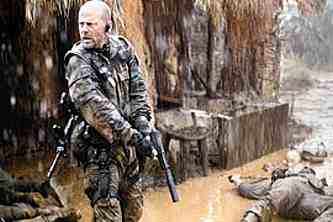 |
|
Bruce Willis
in TEARS OF THE SUN. |
A 2003 Bruce Willis film might
have been inspired by the predicament the general found himself in. Willis' small company
was ordered to abandon African refugees (from Nigeria) in line for massacre, and he and
his men decided instead to "do the right thing," and play heroes. In fact, the
tagline for TEARS OF THE SUN was, "He was trained to follow orders. He became a
hero by defying them." But this was indeed a Hollywood movie, and "real
life" does not work in the same way. (A quote by Edmund Burke featured in the film
was, "The only thing necessary for the triumph of evil is for good men to do
nothing." The statement may resonate with truth for European and American
national leaders who twiddled their thumbs, but not for a good man like Dallaire, who
appears to have done what he was capable of, given his restrictions.
Caplan: "Senator Destexhe, out of the blue, launched a personal attack on Roméo
Dallaire for allowing, he helped kill ten Belgian soldiers. It was immediately clear to me
that this was opportunistic and was done just because there was a whole lot of
international media sitting in the front row."
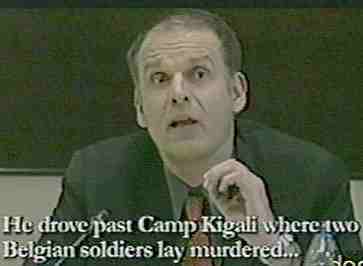
Belgian Senator Alain Destexhe
The Belgian Senator, Alain Destexhe, at one point actually stated, "He obeyed orders
that were criminal instead of saving the lives of Tutsis." What a creep! Those were
not the most humanistic orders, to be sure, but certainly not criminal ones, such as the
shooting of unarmed civilians would have been. (Or the torturing of prisoners.) A professional soldier is expected to do his
duty, and that involves the obeying of orders, including stupid and unfair orders, of
which there is no shortage of in any army. If a soldier only obeys the orders he likes,
that would not make for an efficient soldier, and the army he serves in would prove to be
unworkable.
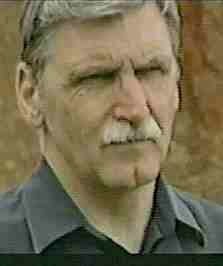 |
|
Roméo
Dallaire even LOOKS like a hero!
Get a load of that jaw. |
The senator's attitude and accusations were particularly galling,
because the Canadian general comes across as a man of integrity; he was simply trapped in
a horrible situation, and did the best he could under the circumstances. (The film tells
us thousands more would have died if not for the actions he was able to perform.)
As Lewis eloquently put it: "There is something tremendously ennobling about Roméo
Dallaire; there is a core of unwavering principle... he may not have made the right
judgment in every single instance in Rwanda, who can tell after the event; but there is
something so profoundly good about the man, and how strongly he attempted to resist the
forces of evil — it's a very memorable moment in human history, Dallaire's conduct in
Rwanda."
|

The general and his wife visit the Bisesero National
Resistance Memorial
featuring rows and rows of skulls. Let's hope some Armenian (or "genocide
scholar," such as Tessa Savvidis Hofmann)
is not getting the brainstorm
for using these skulls as proof of the Armenians' supposed genocide,
as with the painting by Vassili
Vereshchagin.
|
We are shown President Bill Clinton's 1998 visit to Rwanda, and a part of his speech
where he was making excuses. Stephen Lewis called a spade a spade: "I think
Clinton knew exactly what was going on in Rwanda. As in so many other things, his
mind was off somewhere else at the time, and he just didn't take it seriously
enough. And all this caterwauling about if only I had known — spare me. He knew."
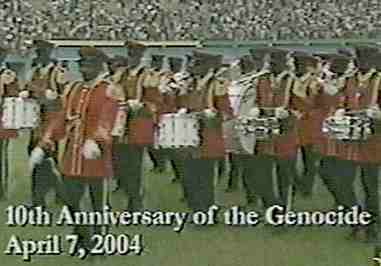
10th Anniversary of the Genocide, April 7, 2004
Caplan: "I was personally distraught by the failure of the western world to
come down to Rwanda to join the ceremony of the tenth anniversary. Here was Canada
sending a former cabinet minister, and there was the United States sending, well, he
wasn't a junior fellow, he was the ambassador for war crimes, but he was a long way
down. I asked a lot of Rwandans about this turn-out, and they said, You know what?
We didn't expect anything. [So] we're not happy; we're a little disappointed. But
we've come to expect nothing from the world, and the world never disappoints us in
that way."
That is sad, but everything is relative. The world has yet to acknowledge the 500,000 Turks/Muslims who were killed by
the Armenians (with a little help from the Russians) during the years of World War
I, not far behind the Rwandan mortality, if numbers have something to do with
determining magnitude. The world has yet to acknowledge the 5.5 million "Turks" killed and a further 5 million
exiled, in the century ending circa WWI. One can even go to a "civilized"
European courtroom in 2007, present
inarguable, concrete evidence, and the West will still choose to be in
"denial." Such is the state of anti-Turkish prejudice yesterday, and
today.
 |
|
French
soldiers marching in Rwanda. You can tell
they are French, since they're wearing berets. |
At the conference, the Rwandan President
(former rebel leader Paul Kagame) did not mince words in his speech: "As for
the French, they knowingly trained and armed government soldiers and militia who
were going to commit genocide."
As he did throughout the documentary, Stephen Lewis offered another nicely worded
knockout blow:
"All of these people know they were wrong. They know that their behavior
allowed the worst genocide at the end of the twentieth century that is imaginable.
And they still, to this day, cannot acknowledge it, and cannot atone for it, and
cannot have the decency and the courage to present themselves to Rwanda and say, we
were wrong, we are here to commemorate the horror with you, we will stand shoulder
by shoulder with you as you attempt to overcome the inheritance. But the world
copped out again. That is I guess what makes one feel that it could happen again. If
you are so irresolute ten years after the event, then maybe it could happen again.
Maybe that's just a commentary on how delinquent we are."
And what an excellent commentary on the hypocrisy of the genocide industry. You
might be aware the "noble" reason they provide for Turkey to recognize the
Armenians' fake genocide is so that future genocides may be prevented. Drumming into
our heads that those who don't remember the past are condemned to repeat it (misquoting George Santanya), the idea
is that if genocides are not acknowledged, it would be all too easy to commit
genocides in the future. We can now see the folly of that remark. Why, even an
"ethical" country like France presumes to tell us how critical genocides
are, to the point where France chooses to outlaw our thinking in any other way. Yet such a supposedly
genocide-conscious country is first in line not only to ignore a genocide as it is
occurring — even when their troops are present to do something about it — but
France actually served as a participant in this particular genocide. We can
now see the utter hypocrisy and stupidity of genocide logic.
Unfortunately, no law or moral posturing will prevent a criminal from committing a
crime, if the criminal is bent on committing the crime. It's the safest bet that
very few, if any, Rwandan Hutus swinging their machetes were thinking about the
Holocaust, or the "Armenian genocide."
|
| |
|
|